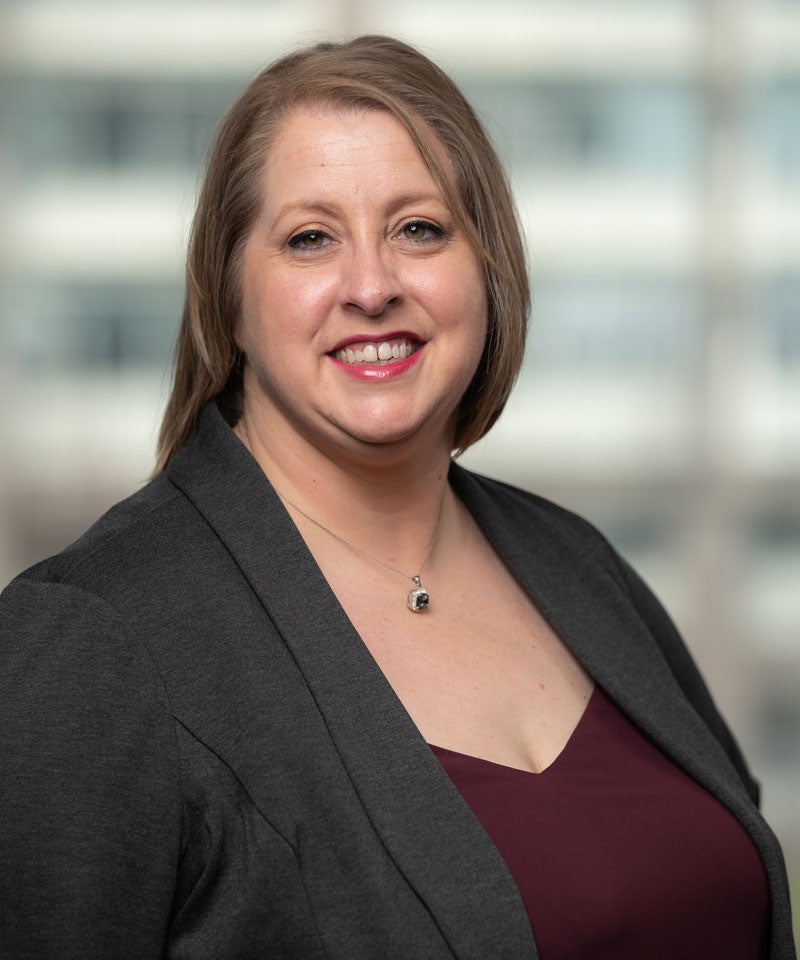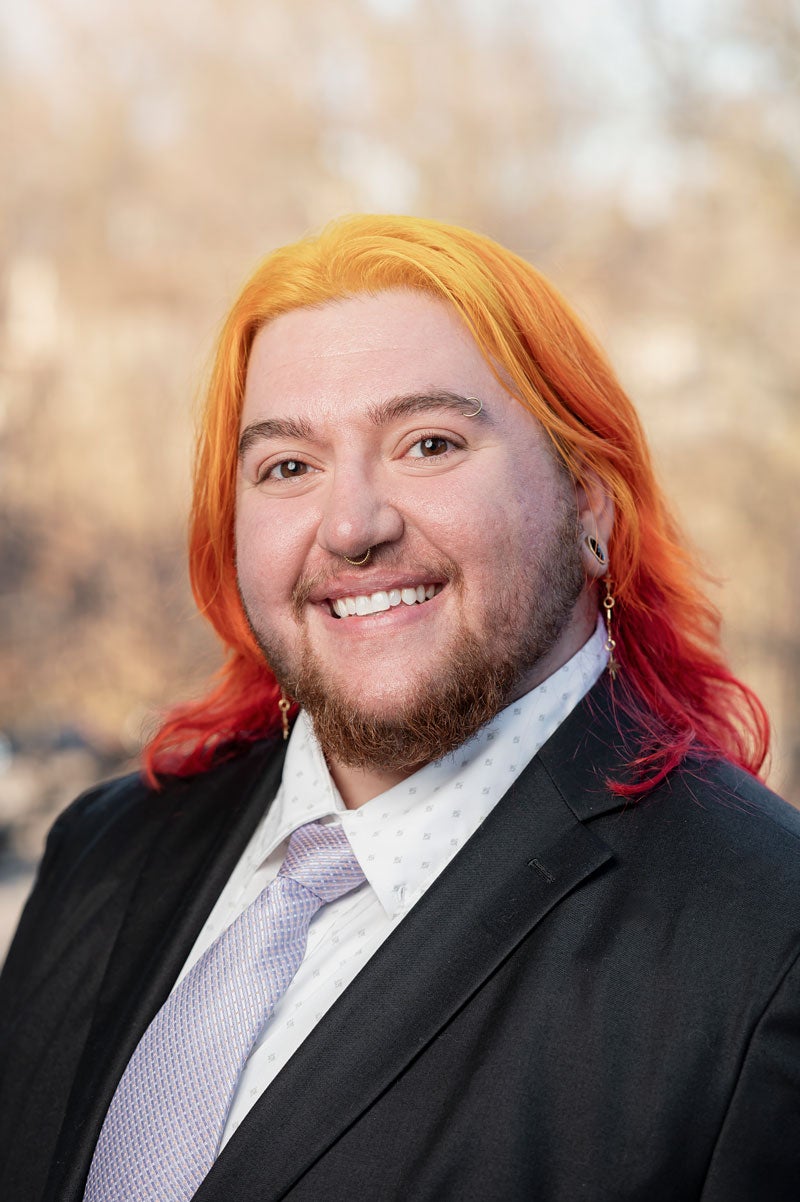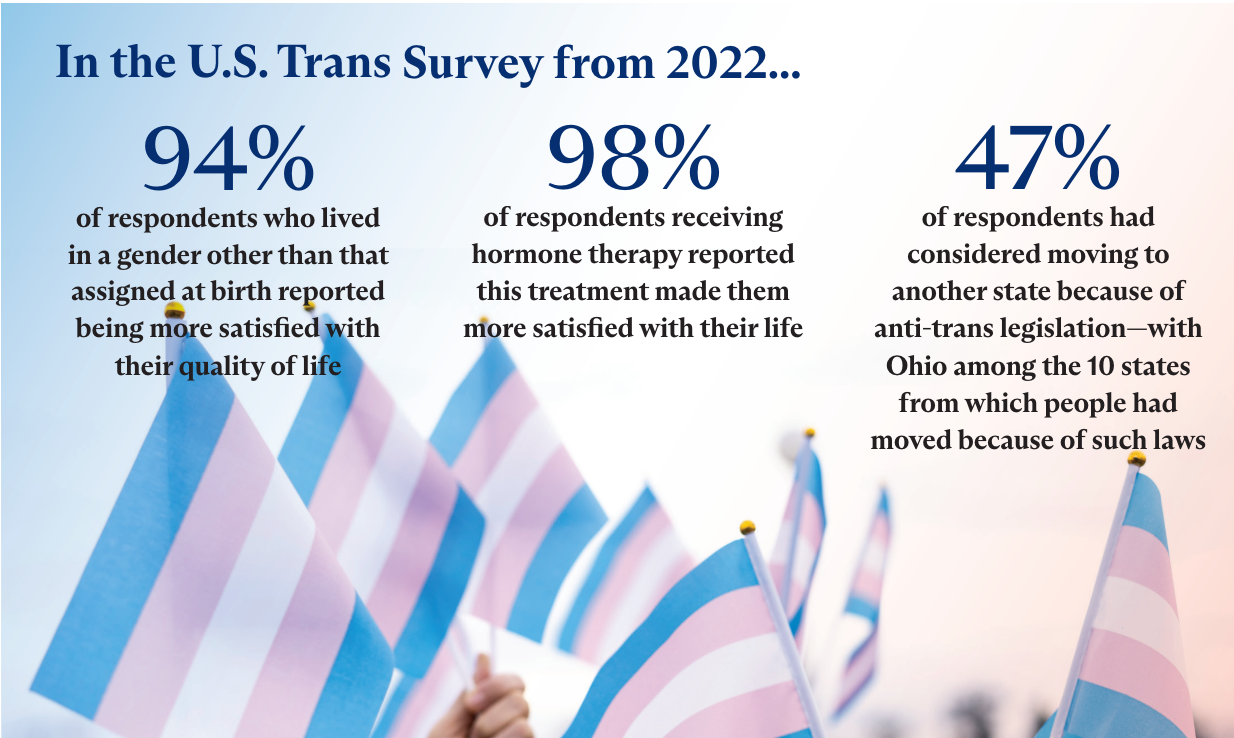As legislation to restrict transgender individuals’ access to care passes around the country, Mandel School faculty, students and alumni consider the impact—and take action
By Emily Mayock
When Sara Roberts’ 15-year-old child told her they are transgender, Roberts felt confident she could navigate the complicated journey on which they were about to embark. After all, Roberts (SAS ’10) was a trained social worker specializing in child and family welfare, a mental health professional and a longtime ally of the LGBTQ+ community.
As the two began maneuvering the doctor’s appointments, hormone therapies, name-change processes and, most of all, social and emotional effects related to her child’s transition, Roberts quickly learned she’d been mistaken.
“Even using my social work skills that I was trained in, I still managed to mess up—and I had to watch as my kid shut down and went through tremendous amounts of depression, anxiety, and suicidal ideations as they tried to figure out their own identity,” Roberts remembered. “I joined support groups, they went to a therapist that was part of the LGBTQ+ community, but even with those networks, there weren’t really resources for parents of trans teens on how to support their kids.”
Roberts ended up finding strong connections through Facebook groups, where she started noticing patterns in the lines of conversation: struggles with name changes, lack of understanding by the parents themselves or their larger communities and heartbreak watching their children be torn down. Worse still, Roberts said, was the regularity with which parents had to band together to grieve the pain—or, sometimes, death—of these children. But Roberts also noticed the strength and joy in these groups, especially celebrating their children’s successes.
“I am ready for this continued fight to ensure that our children are allowed to be their true selves without the systemic oppression they are facing today.”
—Sara Roberts
Seven years later, Roberts’ son, who uses a range of pronouns, is a thriving college student—and Roberts is back at the Jack, Joseph and Morton Mandel School of Applied Social Sciences, teaching courses on policy and advocacy while working toward her PhD.
Her research focus is driven by her own experience: developing resources for parents and families of trans children, from initial understanding and affirmation to advocacy and education.
“Despite knowing the challenges that we are facing,” Roberts said, “I am ready for this continued fight to ensure that our children are allowed to be their true selves without the systemic oppression they are facing today.”
A look at the landscape
Roberts’ work—alongside more from Mandel School faculty, students and alumni—is becoming increasingly critical and complex, as state legislatures across the country pass laws to limit access to medical care for transgender children.
Ohio’s House Bill 68, for example, would outlaw gender-affirming care for minors (except for those already receiving care), ban transgender girls and women from participating in girls’ and women’s sports, and introduces a number of bioethical requirements and adjustments to healthcare practice. Republican Gov. Mike DeWine vetoed the bill in December, specifically noting parents’ rights in health decision-making and calling the focus on gender-confirmation surgery a “fallacy,” as no children’s hospitals in the state perform such surgeries. State legislators overrode his veto in January, but a judge placed the law on a short pause just two weeks before it was to go into effect.
Simultaneously, the number of youth who identify as transgender is on the rise nationally—doubling since 2017, according to a 2022 study from University of California, Los Angeles. In Ohio, 1.15% of youth ages 13–17 identify as transgender, compared to .51% of all adults over the age of 18.
Phyllis “Seven” Harris (MNO ’05), executive director of the LGBT Community Center of Greater Cleveland, said she’s seen this firsthand. The center has expanded its programming to meet their needs and also launched the Advocacy in Action initiative to conduct advocacy work and policy education for the community—including social workers, such as Roberts, who are seeking guidance in an ever-changing climate.
“As social workers, we are called to fight social injustice, period,” Roberts said. “Our call to action is to advocate for marginalized populations and meet people where they are. So now it’s about understanding how we do that under the new legislation.”
Policy in practice
The Ohio chapter of the National Association of Social Workers (NASW) held a training and released a 30-page guidebook in late February on navigating the “unprecedented change to social work” brought about by HB68. Their guidance outlines everything from ethical concerns to documentation requirements to a decision chart for responding to subpoenas.
Harley Rubin, a second-year Master of Social Work student focusing on community practice, policy advocacy and health practice with the transgender and gender-diverse population, is the Mandel School’s MSW student representative on the board of NASW of Ohio. In this role, and as vice president of equity and inclusion on the university’s Graduate Student Council, he’s worked on advocacy campaigns for a variety of causes, including in support of transgender rights.
Rubin, who is also doing a field practicum at University Hospitals focused on gender-affirming care and has presented at conferences on the topic, said he fears social workers will be discouraged from working with trans youth at all, or that they won’t be open to having critical conversations surrounding gender exploration.
Dana Prince, PhD, an associate professor who specializes in the impacts and outcomes of sexual- and gender-minority youths in foster care, cited similar concerns of a “chill effect” in which practitioners are scared, confused or unaware of how to provide care to transgender, nonbinary and gender-nonconforming youth.
“What you’re doing with these laws is putting in more barriers to mental healthcare, and you’re targeting trans youth, which has a certain structural violence beneath it,” Prince said, citing the recent death of a nonbinary teen, Nex Benedict, in Oklahoma, days after they were beaten in a school bathroom. “But it’s also putting in barriers for mental health practitioners who are just trying to do their jobs. Can you imagine the burden we are placing on already-overworked social workers by putting [the regulations of HB68] in place?”
But while Prince’s and Rubin’s concerns for social workers’ responsibilities are vast, more than anything, they fear what legislation like HB68 would do for trans youth. Prince said she is confident trans youth are already internalizing the legislation, feeling their gender identity is “unsafe” to talk about.
“For youth who understand their identities early on, delays in care, like those HB68 would cause, could be life-threatening.”
—Harley Rubin, in written testimony opposing Ohio House Bill 68
In December, Rubin provided written testimony (a skill honed through his “Legislative and Political Processes” course at the Mandel School) to the Ohio Senate Government Oversight Committee. Rubin detailed his experiences transitioning as a teenager, including a suicide attempt at age 15 before he had access to gender-affirming care.
He is not alone. Nearly one in five transgender and nonbinary youth reported attempting suicide, and more than half considered it, according to the 2022 National Survey on LGBTQ Mental Health by The Trevor Project. And, data from Prince’s research team shows the rates are even higher among trans and nonbinary youth in foster care, who often end up in the system because of non-affirming home situations.
In addition, the vast majority of transgender youth experienced symptoms of anxiety and/or depression, the Trevor Project report stated. Among their worries: 93% of transgender and nonbinary youth said they are concerned about transgender people being denied access to gender-affirming medical care due to state or local laws.
In his testimony, Rubin cited a 2023 randomized clinical trial of 64 transgender and gender-diverse adults that found a significant decrease in depression and suicidality among those who were able to receive gender-affirming care immediately. “For youth who understand their identities early on,” Rubin wrote in his testimony, “delays in care, like those HB68 would cause, could be life-threatening.”
Ohio’s bill in particular requires parental consent to receive mental health support for a “gender-related disorder,” which the NASW says does not have sound clinical criteria.
“We are already pathologizing trans youth by forcing them to have a mental health diagnosis in order to receive gender-affirming care. They’re being forced to see themselves from a deficit perspective,” said PhD candidate Braveheart Gillani, whose research and advocacy focus on sexual and gender minorities and healthy masculinity development, along with issues of racial equity and social justice. “But what we need to see is the joy and resilience that exist in this community. As [author and theorist] bell hooks noted, innovation and resilience happen in the margins—because those are the people who are oppressed. That’s what’s happening here.”
Expanding support
Gillani sees this in practice through his work on the board of the LGBT Community Center of Greater Cleveland, where he works with Harris and Managing Director Gulnar Feerasta (MNO ’16, SAS ’16) on a variety of initiatives—including improving the research done at the center, advocating for appropriate and respectful compensation of queer research participants, and ensuring research results get disseminated openly back to the community.
For her part, Feerasta has been integral in increasing the programmatic efforts of the center for trans people. It’s all about ensuring they’re meeting the needs of their community and centering their experiences, she explained.
“Someone once said to me, ‘This is the LGBT Center, but I don’t see anything for the ‘T,’” Feerasta recalled. “That was eye-opening for me because this person saw it through their lived experience, which I didn’t have.”
In addition to resources, the center now offers Trans+, a three-hour, semiweekly meeting space for trans and nonbinary individuals, as well as a variety of support groups for families and resources such as assistance navigating healthcare.
“As a community center, we feel it’s very important to continue to hold and create that space for the community,” Feerasta said. “The center’s role right now really is being a place of respite—a place where you can put your shoulders down, grab a cup of coffee, breathe and be you … before you have to go back out into the world that wants to erase you.”
The center also focuses on helping parents and patients alike navigate the healthcare landscape as trans people and their families seek healthcare options.
Seeing trans youth become “their whole selves” at the center has been nothing short of enriching for Harris and Feerasta—and for the children’s parents and family members, who may have struggled to gain support and resources, like Roberts once did.
“These parents are stepping up to say, ‘My kid is a whole other kid now that we’ve allowed them to acknowledge who they are,’” Harris said. “It doesn’t mean every day is bells and whistles, but knowing what we can offer and how we can help these families means the world.”
Read more stories like this in the Spring 2024 edition of Action.








